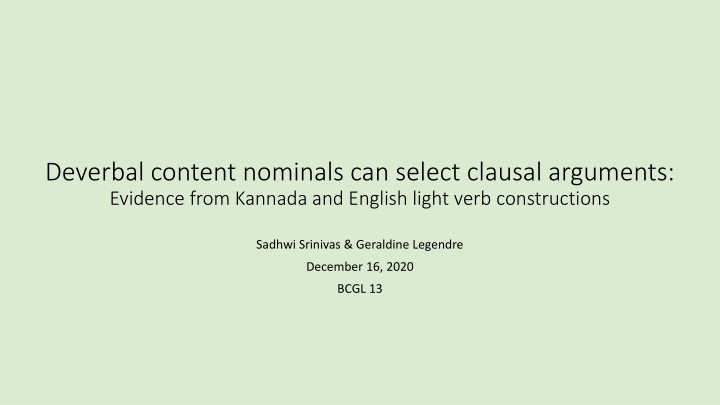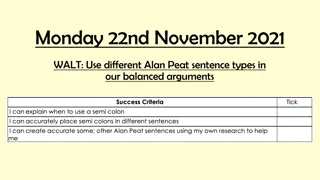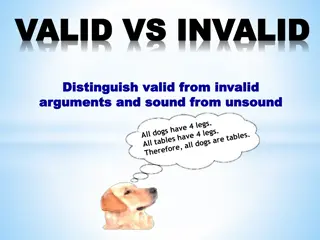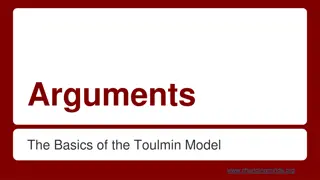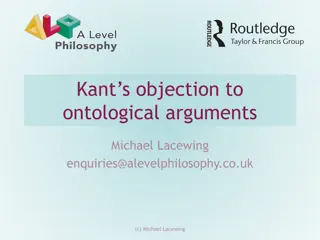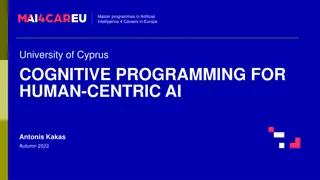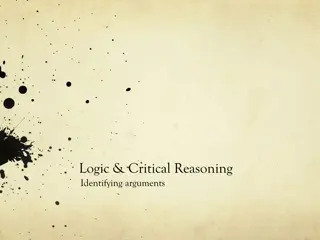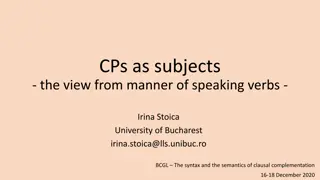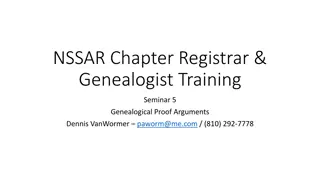Deverbal Nominals and Clausal Arguments
This study investigates whether deverbal content nominals like "thought," "belief," and "claim" can select clausal arguments, focusing on evidence from Kannada and English light verb constructions. The analysis explores the nature of clausal attachments to nouns and considers whether they function as arguments or adjuncts.
Download Presentation

Please find below an Image/Link to download the presentation.
The content on the website is provided AS IS for your information and personal use only. It may not be sold, licensed, or shared on other websites without obtaining consent from the author.If you encounter any issues during the download, it is possible that the publisher has removed the file from their server.
You are allowed to download the files provided on this website for personal or commercial use, subject to the condition that they are used lawfully. All files are the property of their respective owners.
The content on the website is provided AS IS for your information and personal use only. It may not be sold, licensed, or shared on other websites without obtaining consent from the author.
E N D
Presentation Transcript
Deverbal content nominals can select clausal arguments: Evidence from Kannada and English light verb constructions Sadhwi Srinivas & Geraldine Legendre December 16, 2020 BCGL 13
Introduction In their verbal form, predicates like think, believe, and claim select clausal content-denoting arguments: (1) John thought/believed/claimed *(that Bill was the culprit). But, in their nominal forms, the clauses seem more adjunct-like: (2) John dismissed the thought/belief/claim (that Bill was the culprit). Question of interest: Is there any environment where clausal attachments to such nouns function as arguments, or are they always adjunct-like?
Introduction Question of interest: Is there any environment where clausal attachments to such nouns function as arguments, or are they always adjunct-like? Strong claim in the literature: deverbal content nominals like thought, belief, claim are always incapable of selecting clausal arguments (Higgins 1973; Stowell 1981; Moulton 2009, 2013, 2015) Here, we consider whether this is true in the case of light verb constructions like (3): (3) John made [the claim [CPthat Bill was the murderer]].
Main claim When deverbal content nominals like thought, belief, decision,claim combine with light verbs, the clause modifying the noun behaves as an argument selected by it (and not an adjunct). (3) John made [the claim [CPthat Bill was the culprit]]. Argument, not adjunct
Talk outline Describe the initial motivation based on Kannada (SOV, Dravidian) light verb constructions for thinking that nouns like belief and claim can select clausal arguments Engage with some evidence against argument selection in nouns like belief and claim, mainly due to Moulton (2009, 2013) Sketch a semantic analysis for light verb constructions that builds on the suggested denotation in Moulton (2013) for deverbal content nouns
Initial motivation: Kannada light verb constructions Verbs like think, believe, decide and claim in Kannada also select clausal arguments: (i) Raama1 *[PRO1 haNNu tar(u)-alu] nirdharisidanu. Raama fruit bring-INF decided.3.SG.M Raama decided to bring fruit. Raama1 V CP nirdharisidanu PRO1 haNNu tar(u)-alu (i) can be productively rephrased as a light verb construction, as in (ii): (ii) Raama1 *[PRO1 haNNu tar(u)-alu] nirdhaara maaDidanu. Raama fruit bring-INF decision do.3.SG.M Raama decided to bring fruit. Raama1 CP V PRO1 haNNu tar(u)-alu V NP nirdhaara maaDidanu
Initial motivation: Kannada light verb constructions However, this isn t the only way to form a light verb construction. A second way is given below: VP Raama1 V (iii) Raama1 *[PRO1 haNNu taru-a] nirdhaara maaDidanu. Raama fruit bring-PART decision do.3.SG.M Raama decided to bring fruit. NP V maaDidanu CP nirdhaara PRO1 haNNu taru-a (participial complement) Compare: Raama1 CP V PRO1 haNNu tar(u)-alu (infinitival comp.) V NP nirdhaara maaDidanu
Several arguments to establish that the CP is part of the NP projection: Morpheme -a appears on common nominal modifiers in multiple contexts: such as in relative clauses, and as possessive markers. Initial motivation: Kannada light verb constructions (i) Mane-ge baru-a nenTaru haNNu taruvaru. (Relative clause) House-DAT come-PART guests fruit bring-FUT-3.PL Guests who come home will bring fruit. However, this isn t the only way to form a light verb construction. A second way is given below: (ii) Avan-a gaaLipaTa (Possessive construction) his kite VP No intervening adverbs are allowed between the participial complement and noun, but adjectives are permitted. Raama1 V (iii) Raama *[PRO haNNu taru-a] nirdhaara maaDidanu. Raama fruit bring-PART decision do.3.SG.M Raama decided to bring fruit. (iii) Raamai [[PROi haNNu taru-a] keTTa/ *nenne nirdhaara]NP maaDidanu. NP V maaDidanu Raama fruit bring-PART bad(ADJ)/ *yesterday(ADV) decision did Raavana made the decision to kill Raama yesterday. CP nirdhaara PRO1 haNNu taru-a (participial complement) The participial complement + nominal can be topicalized separately, showing that they together form a constituent. Compare: (iv) [PROi haNNu taru-a nirdhaara] Raamai maaDidanu. fruit bring-PART decision Raama did The decision to bring fruit, Raama made yesterday. Raama1 CP V PRO1 haNNu tar(u)-alu (infinitival comp.) V NP nirdhaara maaDidanu
Initial motivation: Kannada light verb constructions 2 types of light verb constructions in Kannada Raama1 *[PRO1 haNNu tar(u)-alu] nirdhaara maaDidanu. Raama fruit bring-INF decision do.3.SG.M Raama decided to bring fruit. Raama1 *[PRO1 haNNu taru-a] nirdhaara maaDidanu. Raama fruit bring-PART decision do.3.SG.M Raama decided to bring fruit. V Raama1 Raama1 CP NP V V maaDidanu CP N? or NP? PRO1 haNNu tar(u)-alu nirdhaara NP V PRO1 haNNu taru-a nirdhaara maaDidanu Infinitival light verb construction Participial light verb construction
Initial motivation: Kannada light verb constructions To the extent that they are possible, light verb constructions in English resemble participial light verb constructions in Kannada the content-denoting clause forms a constituent with the noun. In the remainder of the talk, we will explore some of the evidence given to show that nouns like thought, belief and claim do notselect content- denoting clausal arguments and evaluate whether they hold within light verb constructions.
General line of reasoning to show that deverbal content nouns do notselect clausal arguments : (cf. Moulton 2009/2013/2015, building on Grimshaw 1990) Whether a deverbal nominal selects an internal argument depends on the nominalization process: i.e., whether they form complex event nominals, simple event nominals, or result nominals. (i) The examination of the students lasted a long time. (Complex event nominal) (ii) The examination lasted a long time. (Simple event nominal) (iii) The examination was photocopied on green paper. (Result nominal; Moulton 2013 ex. 5a-c) Only complex event nominals can select internal arguments.
General line of reasoning to show that deverbal content nouns do notselect clausal arguments : (cf. Moulton 2009/2013/2015, building on Grimshaw 1990) But: verbs like think, believe and claim are said to never form complex event nominals. they only form result nominals Diagnostics for their result nominal status: (1) Availability of aktionsart modifiers (Moulton 2013) (2) Distributional evidence (Moulton 2009)
(1) Availability of aktionsart modifiers (Moulton 2013) Only complex event nominals can take aktionsart modifiers, result nominals cannot. complex event nominal, since it co-occurs with internal argument of the city (i) The total destruction of the city in two days/*for two days appalled everyone. (ii) The total destruction (*in two days) appalled everyone. nominal result Deverbal content nouns seem to never be compatible with aktionsart modifiers, indicating their status as result nominals: (iii) The claim (*for two years) that the earth was flat (*for two years). (iv) John [rejected [the claim that the earth was flat] [for two years]]. adverbial modifying reject
(1) Availability of aktionsart modifiers (Moulton 2013) However: in light verb constructions with deverbal content nominals, aktionsart modifiers are licensed and moreover, only those aktionsart modifiers are licensed that are compatible with the nominal. (i) a. John had the belief for years/*in a month that Bill was the thief. b. John believed for years/*in a month that Bill was the thief. (ii) a. John made the decision in a minute/*for a minute to send Mary to college. b. John decided in a minute/*for a minute to send Mary to college. (iii) a. John made the claim for a year/*in a year that Bill was the thief. b. John claimed for a year/*in a year that Bill was the thief.
(2) Distributional evidence (Moulton 2009) Recall that only complex event nominals could co-occur with internal arguments realized as DPs (supported by case-marking of), result nominals can t do so. The examination (*of the students) was copied on blue paper Saturating the internal argument in result nominals leads to compositional failure (Moulton 2009). x. e. examine (x)(e) It is important that the internal argument be unsaturated at this stage. Otherwise, further composition with the is not possible. examination the x. e. examine (x)(e) Result nominalization existentially closes off the event argument. V Nom: e denotation of the verb examine examine x. e. examine (x)(e)
(2) Distributional evidence (Moulton 2009) Deverbal content nouns are claimed to be capable only of forming result nominals It follows that their internal argument should never be saturated Moulton supports this prediction by observing that content-denoting DP arguments of type e are not in fact permitted with nominals like thought/belief/claim * John s belief of that idea * John s claim of something * Her thought of that (Moulton 2009, ex. 59a, 60a, 61a)
(2) Distributional evidence (Moulton 2009) However, there do seem to be attested examples where the nominal does co-occur with content-denoting DP arguments The following are from the Corpus of Contemporary American English (Davies 2008): (i) They project an unshakeable belief of the rightness of their cause. (ii) His belief of the importance of the family as the foundation of the program (iii) Vietnamese have also been culturally imbued with the belief of the coexistence between yin and yang. (iv) He would reject Machiavelli s claim of the necessity of unlimited acquisition as well as the unlimitedness of Hobbes s notion that happiness is the continual satisfaction of desire after desire, which ceases only in death. These are bona fide content arguments and not aboutness arguments, as seen by their incompatibility with the further addition of a that-clause: * Their belief of the rightness of their cause is that it is right.
Analysis: Overview Following Moulton (2013), we adopt the idea that deverbal content nouns like thought/belief/claim do not actually have access to an event argument. Clauses combine with the nominal via predicate modification. We assume that predicate modification as the mode of composition is not restricted only to adjuncts The light verb is responsible for introducing the event argument. After the light verb is merged, the fragment at LF now resembles the verb. At this stage, the nominal assigns a theta role to the clausal complement ( -assignment at LF, following Larson 1988, Hoshi & Saito 1993, Saito & Hoshi 1994, Hoshi 1994).
Nominal denotation Recall that while deverbal content nominals admit appropriate aktionsart modifiers, the presence of the light verb is essential to license the modifier. ( the claim that the Earth was flat (*for two years) ) This behavior is unlike other event nominals ( the destruction of the city in two days ) Following Moulton (2013), we take this to indicate the lack of access to an event argument. We adopt the denotation proposed for these nominals in Moulton (2013), as predicates of content-full individuals (see also Moltmann 2013): [[thought]] = xc . thought(xc) [[belief]] = xc . belief(xc) [[claim]] = xc . claim(xc)
Light verb denotation The light verb combines with the nominal and introduces an event argument. [[light-verb]] = P<e,t> . xe . ev . MAKE(x, e) & P(x) A functional building block of event structure, akin to Hale & Keyser s (1992) little v The deverbal nominal argument like claim The event argument introduced by the light verb
Composition example: Kannada Raama1 *[PRO1 haNNu tar(u)-alu] nirdharisidanu. Raama fruit bring-INF decided.3.SG.M Raama decided to bring fruit. Raama1 *[PRO1 haNNu taru-a] nirdhaara maaDidanu. Raama fruit bring-PART decision did.3.SG.M Raama decided to bring fruit. x . e. MAKE(x)(e) & decision (x) & fCONT(x) = w. bring(fruit)(Raama)(w) (function application) x . e. decide (x)(e) & fCONT(x) = w. bring(fruit)(Raama)(w) (predicate restriction) Raama1 Raama1 x. thought (x) & fCONT(x) = w. bring(fruit)(Raama)(w) (predicate modification) maaDidanu P. x. e . MAKE(x)(e) & P(x) nirdharisidanu x. e. decide (x)(e) nirdhaara x. decision (x) PRO1 haNNu tar(u)-alu x. fCONT(x) = w. bring(fruit)(Raama)(w) PRO1 haNNu taru-a x. fCONT(x) = w. bring(fruit)(Raama)(w) *fCONT: Moulton 2009
Composition example: Kannada Raama1 *[PRO1 haNNu tar(u)-alu] nirdharisidanu. Raama fruit bring-INF decided.3.SG.M Raama decided to bring fruit. Raama1 *[PRO1 haNNu taru-a] nirdhaara maaDidanu. Raama fruit bring-PART decision did.3.SG.M Raama decided to bring fruit. Theta role to the content argument is assigned here, after the light verb is merged. (cf. Baker 2003) x . e. MAKE(x)(e) & decision (x) & fCONT(x) = w. bring(fruit)(Raama)(w) (function application) x . e. decide (x)(e) & fCONT(x) = w. bring(fruit)(Raama)(w) (predicate restriction) Raama1 Raama1 x. thought (x) & fCONT(x) = w. bring(fruit)(Raama)(w) (predicate modification) maaDidanu P. x. e . MAKE(x)(e) & P(x) nirdharisidanu x. e. decide (x)(e) nirdhaara x. decision (x) PRO1 haNNu tar(u)-alu x. fCONT(x) = w. bring(fruit)(Raama)(w) PRO1 haNNu taru-a x. fCONT(x) = w. bring(fruit)(Raama)(w) *fCONT: Moulton 2009
Composition example: Kannada Raama1 *[PRO1 haNNu taru-a] nirdhaara maaDidanu. Raama fruit bring-PART decision do.3.SG.M Raama decided to bring fruit. Raama1 *[PRO1 haNNu tar(u)-alu] nirdharsidanu. Raama fruit bring-PART decided.3.SG.M Raama decided to bring fruit. x . e. thought (x)(e) & fCONT(x) = w. bring(fruit)(Raama)(w) & AGENT(e)=Raama x . e. MAKE(x)(e) & thought (x) & fCONT(x) = w. bring(fruit)(Raama)(w) & AGENT(e)=Raama e e x . e. thought (x)(e) & fCONT(x) = w. bring(fruit)(Raama)(w) x . e. MAKE(x)(e) & thought (x) & fCONT(x) = w. bring(fruit)(Raama)(w) x x Raamai Raamai x. thought (x) & fCONT(x) = w. bring(fruit)(Raama)(w) (predicate modification) yoochisidanu x. e. thought (x)(e) maaDidanu P. x. e . MAKE(x)(e) & P(x) PRO1 haNNu tar(u)-alu nirdhaara x. decision (x) x. fCONT(x) = w. bring(fruit)(Raama)(w) PRO1 haNNu taru-a x. fCONT(x) = w. bring(fruit)(Raama)(w)
Composition in English At first glance, it seems like composition in English cannot proceed in a similar way, since English does not generally allow singular bare nouns in these contexts, and the presence of the is standardly taken to indicate the availability of a unique referent. (1) John made the claim that Bill was the murderer. This is unlike the denotation of verbal claim, due to the absence of the content argument. e. MAKE( x. claim (x) & fCONT(x) = w. murderer (Bill)(w))(e) (function application + LOWER) John x. claim (x) & fCONT(x) = w. murderer (Bill)(w) LIFT y. y = x. claim (x) & fCONT(x) = w. murderer (Bill)(w) made P. z. e . MAKE(z)(e) & P(z) x. claim (x) & fCONT(x) = w. murderer (Bill)(w) (predicate modification) the P. x. P(x) claim x. claim (x) that Bill was the murderer x. fCONT(x) = w. murderer (Bill)(w)
Composition in English Assume the definite article in English light verb constructions are not regular but weak definites (Aguilar Guevara 2014, Aguilar-Guevara and Zwarts 2010, Schwarz 2014, Poesio 1994,Carlson and Sussman 2005 i.a) Weak definites are not associated with a uniqueness presupposition (e.g., Mary took the train to London when she changed trains in the middle) They have been sometimes claimed to be cases of DP-incorporation in English (Dayal 2015) Compatible with lack of existence presuppositions as well, which especially arise with verbs of creation ( Mary didn t write the only decent paper does not imply existence of an only decent paper ) Lack of uniqueness implication: Lack of existence implication: In light verb constructions, the nominal forms a complex predicate with the light verb of creation. made the decision yet. 2 different instances John made the decision to go to Harvard, but Mary hasn t Mary hasn t made the decision to go to Harvard yet. decision does not yet exist Definite noun phrases within light verb constructions in English seem compatible with both non-uniqueness and non-existence properties (pending further investigation ) has rejected the decision too. same instance John rejected the decision to send Bill to Harvard, and Mary Mary hasn t rejected the decision to send Bill to Harvard yet. decision exists
Composition in English Coppock & Beaver s (2015) type-shifting analysis of the [[the]] = P. x. P(x) if |P| <= 1; undefined otherwise iota type-shift is only licensed when both existence and uniqueness can be presupposed in the absence of these, composition can proceed with the predicative meaning of [[the P]]
Composition in English (1) John made the claim that Bill was the murderer. Identical to verbal claim x . e. MAKE(x)(e) & claim (x) & fCONT(x) = w.murderer (Bill)(w) John made x. claim (x) & fCONT(x) = w.murderer (Bill)(w) P. x. e . MAKE(x)(e) & P(x) x. claim (x) & fCONT(x) = w. murderer (Bill)(w) (predicate modification) the P. x. P(x) claim x. claim (x) that Bill was the murderer x. fCONT(x) = w. murderer (Bill)(w)
Conclusions Deverbal content nominals occurring within light verb constructions seem more verb-like than their counterparts elsewhere These are potential candidates for true clausal argument-selecting nominals Supporting evidence for this view comes from light verb constructions in both Kannada and English A preliminary semantic analysis supports a weak definite analysis for English the within these constructions, as well as -assignment at LF
Consequences and outlook Distinguishing between the status of clausal complements to nouns within light verb constructions vs. others gives a new perspective on Ross s DP-island puzzle: ?The purse that John made the claim that Mary stole (was found yesterday). * The purse that John heard the claim that Mary stole (was found yesterday). How do of DP complements work compositionally? is of really semantically vacuous? Other contexts apart from light verb constructions where deverbal content nouns act as argument-selecting event nominals? possessives?
